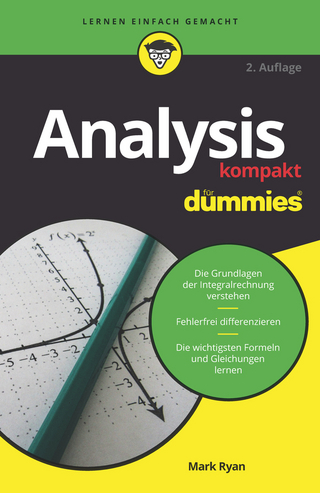
Handbook of Research Methods in Complexity Science
Edward Elgar Publishing Ltd (Verlag)
978-1-78536-441-9 (ISBN)
This comprehensive Handbook is aimed at both academic researchers and practitioners in the field of complexity science. The book’s 26 chapters, specially written by leading experts, provide in-depth coverage of research methods based on the sciences of complexity. The research methods presented are illustratively applied to practical cases and are readily accessible to researchers and decision-makers alike.
The Handbook'’s wide range of research methods are clearly illustrated with case studies that demonstrate their practical application. They range from the regeneration of communities to musical performance; from complex governance networks to psychotherapy; from gender dynamics to agent-based modelling; and the appropriate response to pandemics. Some unusual research methods – based on art, psychology and multi-level networks – are also included. Furthermore, the book incorporates discussions on the philosophical aspect of research methods and explores important theoretical concepts, such as exaptation, emergence, self-organisation and co-evolution.
This is an ideal resource for academics and researchers in the field seeking and exploring new research methods. For decision-makers and researchers trying to address complex challenges it will be an essential source of inspiration that will arm them with effective state-of-the-art research methods for the future.
Contributors include: P. Allen, P. Andriani, S. Banerjee, Y. Bar-Yam, P. Beautement, C.R. Booth, J. Bromley, H.L. Brown, J. Burton, G. Carignani, B. Castellani, G.C. Crawford, C. Day, C.J. Dister, R. Durie, E.G. Eason, K.M. English, J. Fortune, M. Gabbay, J. Goldstein, J.K. Hazy, K. Hopkinson, N. Hupert, E.S. Ihara, H.J. Jensen, J. Johnson, D.G. Kelty-Stephen, W.G. Kennedy, L. Kuhn, B. Lichtenstein, C. Lundy, B. McKelvey, E. Mitleton-Kelly, S. Mockett, G. Morçöl, S. Mukherjee, S.K. Palit, A. Paraskevas, B. Pourbohloul, R. Rajaram, F.A. Razak, K.A. Richardson, J. Rowan Scott, Y. Shapiro, S. Kim, J. Stead, H. Stuteley, A. Tait, C.J. Tompkins, L. Varga, X. Wan, P.R. Wolenski, M.E. Wolf-Branigin, K. Wyatt
Edited by Eve Mitleton-Kelly, Director, Complexity Research Group, London School of Economics and Political Science, Alexandros Paraskevas, Chair in Hospitality Management, University of West London and Christopher Day, Senior Research Associate, Complexity Research Group, London School of Economics and Political Science, UK
Contents:
Editors’ introduction by Eve Mitleton-Kelly, Alexandros Paraskevas and Christopher Day
PART I COMPLEXITY SCIENCE RESEARCH PHILOSOPHY
Introduction to Part I by Henrik Jeldtoft Jensen
1. Introduction to the Strategy and Methods of Complex Systems
Yaneer Bar-Yam
2. Complex Evolving Social Systems: Unending, Imperfect Learning
Peter Allen
3. Information theoretic measures of causality: Music performance as a case study
Fatimah Abdul Razak, Xiaogeng Wan and Henrik Jeldtoft Jensen
PART IICASE-BASED QUALITATIVE TECHNIQUES
Introduction to Part II by Peter Allen
4. Addressing Global Challenges: the EMK Complexity Methodology
Eve Mitleton-Kelly
5. Complexity informed social research: from complexity concepts to creative applications
Lesley Kuhn
6. From Isolation to Transformation with C2
Hazel Stuteley and Jonathan Stead
7. Using complexity principles to understand the nature of relations for creating a culture of publically engaged research within Higher Education Institutes
Robin Durie, Craig Lundy and Katrina Wyatt
PART IIIVISUAL METHODOLOGIES
Introduction to Part III by Alexandros Paraskevas
8. The Art of Complexity: Using visual artefacts and dialogue to bridge the gap between strategic plans and local actions in organisations
Julian Burton and Sam Mockett
9. Inner Complexity: Using Landscape of the Mind to catalyse change in organisations
Kate Hopkinson
10. On the Visualization of Dynamic Structure: Understanding the distinction between static and dynamic network topology
Kurt A. Richardson and Andrew Tait
11. Network Text Analysis and Social Network Analysis in Investigating Complex Governance Networks: Applications of AutoMap and ORA
Göktuğ Morçöl and Sohee Kim
PART IVMODELLING & STATISTICAL ANALYSIS OF EMPIRICAL DATA
Introduction to Part IV by Bill McKelvey
12. Using maximum likelihood estimation methods and complexity science concepts to research power law-distributed phenomena
G. Christopher Crawford and Bill McKelvey
13. Multifractal signatures of intersectionality: Nonlinear dynamics permits quantitative modeling of hierarchical patterns in gender dynamics at the cultural level
Hannah L. Brown, Chase R. Booth, Elizabeth G. Eason and Damian G. Kelty-Stephen
14. Modeling Social Complexity in Infrastructures: A Case-based Approach to Improving Reliability and Resiliency
Carl J. Dister, Brian Castellani and Rajeev Rajaram
15. Phase Transitions and Social Contagion As Enabling Mechanisms for Coordinated Action in Populations: A Mathematical Framework
James K. Hazy and Peter R. Wolenski
16. Applying Complex Adaptive Systems to Agent-Based Models for Social Programme Evaluation
Michael E. Wolf-Branigin, William G. Kennedy, Emily S. Ihara and Catherine J. Tompkins
17. Complexity, the Bridging Science of Emerging Respiratory Outbreak Response
Babak Pourbohloul, Krista M. English and Nathaniel Hupert
PART VMULTI-LEVEL NETWORKS
Introduction to Part V by Patrick Beautement
18. Multilevel Systems and Policy
Jeffrey Johnson , Joyce Fortune and Jane Bromley
19. Complex Scenarios in Socio-Economic Data: A Comprehensive Analytical study
Sanjay Kumar Palit, Santo Banerjee and Sayan Mukherjee
20. Employment of Tools and Models Appropriate to Complex, Real-world Situations
Patrick Beautement
21. Leadership Network Structure and Influence Dynamics
Michael Gabbay
PART VIMIXED METHODS & COMPLEX ANALOGIES
Introduction to Part VI by Benyamin Lichtenstein
22. Complex analogy and modular exaptation: some critical clarifications
Pierpaolo Andriani and Giuseppe Carignani
23. Emergence and Radical Novelty: From Theory to Methods
Jeffrey A. Goldstein
24. Applying the 15 Complexity Sciences: Methods for Studying Emergence in Organizations
Benyamin Lichtenstein
25. Mixed methods research: A method for complex systems
Liz Varga
26. Dynamical Systems Therapy (DST): Complex adaptive systems in psychiatry and psychotherapy
Yakov Shapiro and J. Rowan Scott
Index
| Erscheinungsdatum | 14.06.2018 |
|---|---|
| Verlagsort | Cheltenham |
| Sprache | englisch |
| Maße | 169 x 244 mm |
| Themenwelt | Mathematik / Informatik ► Mathematik ► Analysis |
| Wirtschaft ► Volkswirtschaftslehre ► Mikroökonomie | |
| ISBN-10 | 1-78536-441-3 / 1785364413 |
| ISBN-13 | 978-1-78536-441-9 / 9781785364419 |
| Zustand | Neuware |
| Haben Sie eine Frage zum Produkt? |
aus dem Bereich


